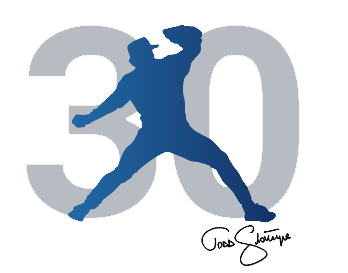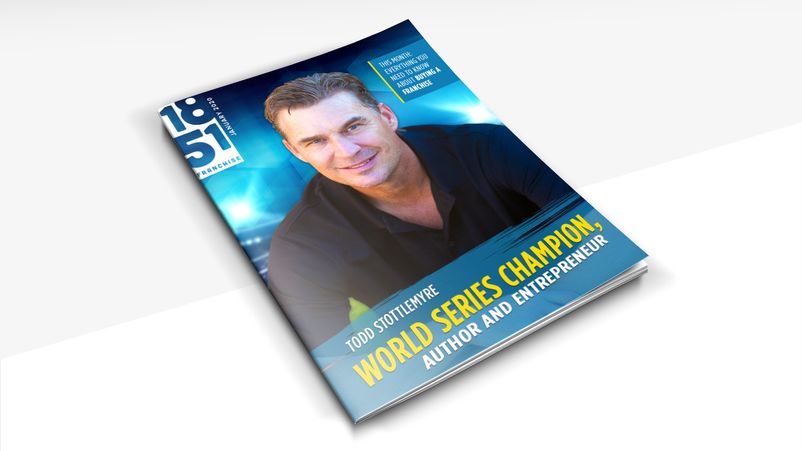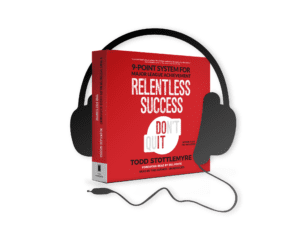How one son followed his father’s footsteps to a career in professional baseball, battling through personal tragedy before arriving at a place of higher self-understanding that has colored his success.
Todd Stottlemyre will be the first person to tell you how fortunate he’s been in his life. His late father, Mel, spent his entire career in professional baseball, first as an esteemed pitcher for the New York Yankees, and then as a pitching coach for his former club and four other teams, as well. Mel Sr.’s life in baseball opened up the door for his sons’ lives to be spent in that ballpark, too—both Todd and his brother, Mel Jr., went on to log major league service.
“I have to give my father a lot of credit,” Todd Stottlemyre said. “My brothers and I grew up in the most incredible environment in the world. That majestic place in The Bronx, Yankee Stadium, was really our playground.”
And what a playground it was—not many people can revisit childhood memories of running through the iconic stadium’s home clubhouse and spending time out on the field during batting practice next to the likes of Mickey Mantle.
“People say you become your environment, and it was like going to the school of champions,” Stottlemyre said. “To grow up in that atmosphere and watch some of the greatest athletes who ever put on a baseball uniform, and then to begin to dream and then live that dream out by following in my father’s footsteps and having the opportunity to play Major League Baseball with some incredible teammates, many of them Hall of Famers, and to land on three World Championship teams… I’ve lived a very blessed life.”
After a 15-year MLB career as a pitcher for the Blue Jays, Cardinals, Athletics, Rangers and Diamondbacks that concluded in 2002, Stottlemyre wasted no time with his second act. He followed up his playing career with a stint on Wall Street, working for an investment firm before building an asset management team and eventually co-founding and launching a hedge fund. Stottlemyre ultimately came to the realization that the financial sector wasn’t the right fit for him—“I loved it as a profession, but not as a lifestyle,” he joked. His natural inclination toward entrepreneurship is what led him to the space he currently occupies as a published author, professional high-performance coach and business developer whose latest venture is helping Arizona-based restaurant Koi Poke prepare to franchise a spinoff concept called Koibito Poke.
To view Stottlemyre’s myriad successes as a direct result of the good fortune that led to him being that kid who grew up in Yankee Stadium would be understandable. It would also neglect the tragedy, anger and the hard-fought path to self-reflection that bred it.
Stottlemyre was 15 years old in 1981 when his youngest brother, Jason, was facing his third bout with Leukemia. Doctors said his only chance of survival was a bone marrow transplant, so the entire Stottlemyre family got tested. Todd was the closest match.
“In that way, my greatest success in life was my greatest tragedy in life. I say that because it was an honor; I had the opportunity that if his body accepted my marrow, my marrow would give him a chance to live—but it didn’t.”
Jason Stottlemyre went into a coma after the transplant and later died. He was 11.
“At 15, I left the hospital the night he passed away with guilt and hate on top of the traditional sadness of losing one of my best friends,” Stottlemyre reflected. “The guilt and hate came from the thought that my marrow killed my little brother. I left there feeling like I had a big part to do with his death.”
The feelings of guilt and hate Stottlemyre harbored in the wake of the loss of his brother controlled him for more than a decade. Looking back on his playing career, it’s clear to Stottlemyre that control, or lack thereof, was reflected on the mound, in more ways than one.
“I was that athlete who always wanted to fight,” Stottlemyre chuckled. “If I was starting a game between 1988 and 1993, it could get exciting. If things weren’t going well for me, I had the mentality that I was taking someone with me. I had the commissioner of baseball tell me, ‘Todd, you‘ve been thrown out of eight games and suspended four times. Something has to change.’ And I’m like yeah, I get it.”
It was after the 1993 season that Stottlemyre met the man he credits with changing his life, sports psychologist Harvey Dorfman, a leading mental skills coach to many MLB players at the time.
“I needed a coach, a mentor, a working partner, and that was Harvey Dorfman. He helped me regain my mindset and understand how our minds, emotions and feelings work,” Stottlemyre said. Through working with Dorfman, Stottlemyre came to terms with the fact he had no control over whether his brother’s body would accept his marrow. “Because I was repressing all of that guilt and hate, it just kept showing up in other areas of my life. Harvey told me, ‘If you’re going to heal, you better feel.’ So I became this student of the study of my own mind and emotions, and how my mind and heart were connected to everything, from how I felt, to how I thought, to how I performed and what my pursuits looked like.”
The impact was clear: Stottlemyre’s mental transformation after the 1993 season was evident through both his on-field behavior and his results.
“If you look at my baseball career from 1988, my first year in MLB, through 1993, and then you look at my career from 1994 until my retirement in 2002, the statistics look like two different people,” he pointed out. “The statistics weren’t lying, either—those were two different people.”
A prominent statistical improvement for Stottlemyre came via the strikeout. From 1988-1993, his average number of strikeouts per 9 innings was 5.0 compared to 7.8 from 1994-2002. He also recorded two 200-strikeout seasons in the latter span. Perhaps the most significant indication of Stottlemyre’s shift in mindset, though, is revealed through his Wins Above Replacement (WAR), a statistic that measures a player’s value in all facets of the game compared to that of a standard replacement-level player. Stottlemyre’s WAR rose from 6.6 from 1988-1993 to 14.4 from 1994-2002.
By harnessing the capacity of his own mind, Stottlemyre was able to unlock a level of focus unreachable by many, and mastered by few. It’s what he described as his “constant pursuit,” even today.
“When I stood on the mound 60 feet, 6 inches away from some of the best hitters in the game like [Barry] Bonds, I had to have the right state of mind that told me, not only am I good enough to compete against him, I’m good enough to beat him in this very moment,” Stottlemyre said. “When you can chase that state and find that state, you can push the level of possibility, and that’s an exciting place to be.”
Arriving at this state of self-efficacy was fueled by Stottlemyre’s learned ability to train his mind, yes, but wouldn’t have been possible without the drive he’d already built up through his battles with adversity, either.
“When you look at failure, the hard part about it is that it’s the place where a lot of people stop moving forward,” Stottlemyre said. “It becomes overbearing, overwhelming, or too much, and sometimes, it will change or alter your next move.” Stottlemyre arrived at this crossroads himself in 1989 after he’d been sent down to the minor leagues for the second year in a row.
“I was frustrated and disappointed because for the first time in my life, I was so close, but I was starting to give in to it a little bit,” Stottlemyre recounted. “I started to wonder, is everyone right? Am I not like my father? And even if I make it back to the major leagues, am I good enough to stay?”
Yet when the voices of those who doubted he would ever be as successful as his father were the loudest, Stottlemyre found the gumption to persevere.
“The one thing that kept me going all the time was that my dream was so big and so constant that even when things were difficult, I could still smell the hot dogs in the ballpark. I could still see myself still performing at that level.”
While recognizing all at once that relenting in the pursuit of his dream would have meant missing out on a 15-year playing career, three World Series titles, playing for a Hall of Fame manager and playing with Hall of Fame teammates, Stottlemyre said, “That’s not even the important part of what I would have missed. I would have missed that it’s possible; that if you dream big enough and work hard enough and just keep going and don’t quit, that it is absolutely possible.”
It was just 30 days later that Stottlemyre got called back up to the major leagues for good. How quickly he went from being at his most vulnerable to realizing his dream isn’t lost on him, and it’s something he keeps top-of-mind to this day—especially as it relates to his entrepreneurial endeavors. This experience, along with the insight gained from the study of his own mind, helps Stottlemyre view his struggles as simply bad moments, conquerable through an unwavering focus on the future.
“In business or in sport, you can begin to focus in the wrong places, and what I mean by that is that if you’re focused on the problem, probably what’s coming are more problems,” Stottlemyre said. “When I’m working with others and I notice their focus is on what happened yesterday or last week, I tell them to focus on right now. What changes can we make right now and what can we apply to keep moving forward?”
Putting this philosophy in practice with the same tenacity that colored his baseball career is how Stottlemyre’s been able to replicate the success he saw on the field in the business space, as well. His pursuit of winning—fulfillment, really—is by no means over, though; with his father as his guide, Stottlemyre’s quest for constant betterment remains his singular mission.
“Instead of thinking wide, I think deep. How deep is my gratitude? How deep is my happiness? I really focus there, and to me, winning is happiness, fulfillment, our health and great relationships. Winning is real, winning is truth, winning is authenticity. And because of that depth, I get so excited because I can’t wait to meet myself five years from now. What will my level of understanding look like? What depth did I really take my life to?”









